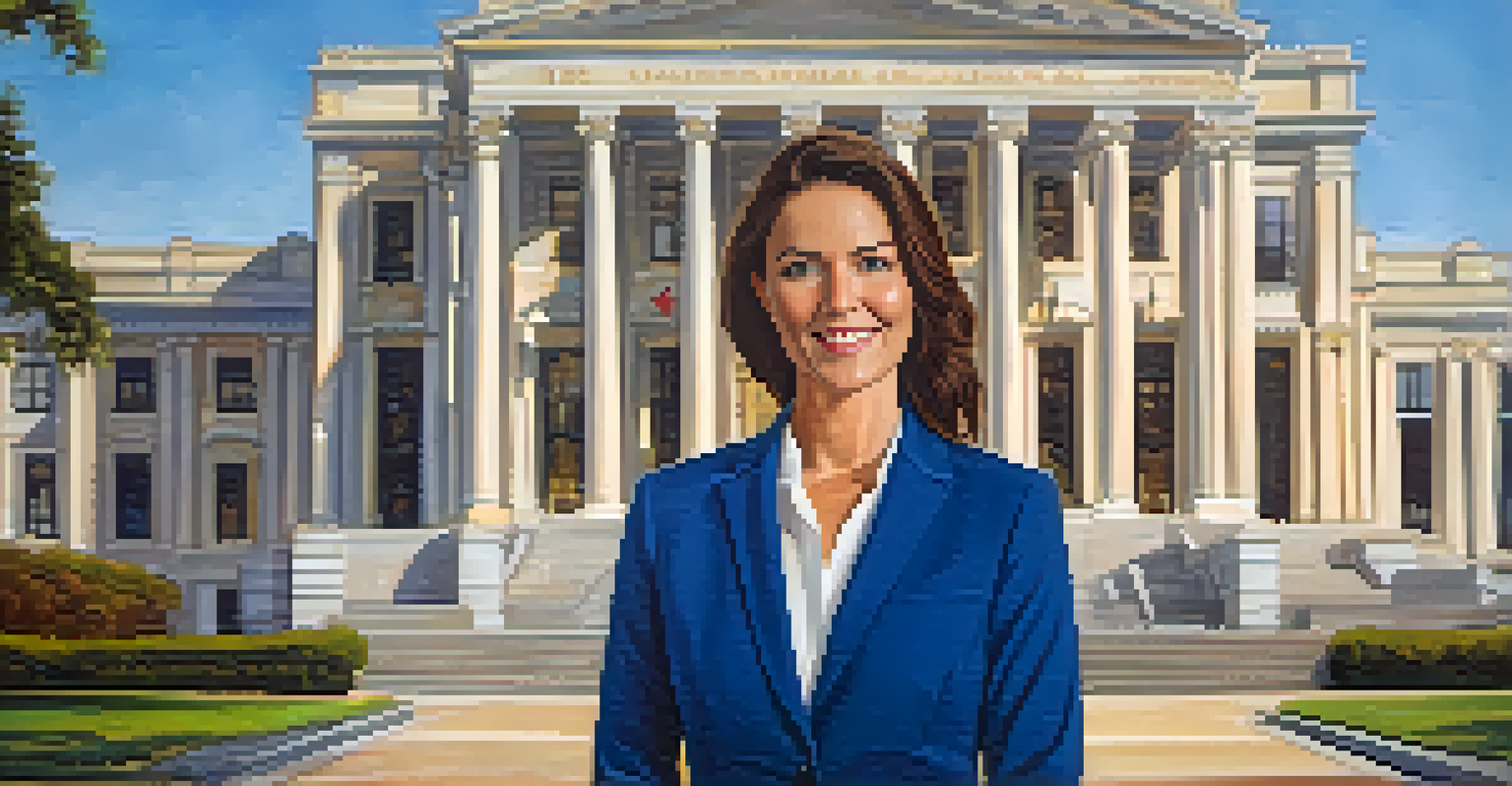Key Political Figures in Louisiana: Their Impact and Legacy

Huey Long: The Charismatic Kingfish of Louisiana Politics
Huey Long, often referred to as the 'Kingfish', was a dominant figure in Louisiana politics during the 1930s. His larger-than-life persona and fiery speeches captivated the public, allowing him to push through significant reforms. Long's policies, particularly the Share Our Wealth program, aimed to redistribute wealth and reduce poverty, leaving a lasting impact on the state's social landscape.
The best way to predict your future is to create it.
However, his controversial methods and autocratic style often drew criticism. While many lauded his efforts to improve education and infrastructure, others viewed him as a dictator who stifled dissent. Despite this mixed legacy, Long's influence is undeniable, and his approach to governance continues to spark debate among historians and political analysts.
Huey Long was assassinated in 1935, but his political dynasty and ideals live on. His legacy can be seen in the strong populist sentiment that still resonates in Louisiana politics today. The Kingfish remains a symbol of both the potential for political reform and the risks of excessive power.
Earl K. Long: The Colorful and Controversial Governor
Earl K. Long, the brother of Huey Long, served as governor of Louisiana during the 1940s and again in the early 1960s. Known for his flamboyant personality and grassroots approach, he continued the legacy of his brother while also carving out his unique political identity. Earl was particularly known for his focus on civil rights and efforts to improve the lives of the working class.

His administration faced numerous challenges, including political opposition and financial difficulties. Nevertheless, he implemented reforms in education and healthcare that resonated with many Louisianans. Earl's ability to connect with the everyday citizen made him a beloved figure, even as he faced controversies throughout his career.
Huey Long's Impact on Politics
Huey Long, known as the 'Kingfish', significantly reshaped Louisiana politics with his populist policies and controversial leadership style.
Earl K. Long's legacy is a testament to the complexities of Louisiana politics. His tenure highlighted the ongoing struggle for social justice and economic equity in a state marked by deep-rooted disparities. Today, he is remembered as a colorful character who left an indelible mark on Louisiana's political landscape.
Katie Barrow: A Trailblazer for Women in Louisiana Politics
Katie Barrow made history as one of the first women to hold a significant political office in Louisiana. Serving in the Louisiana House of Representatives during the 1970s, she was a fierce advocate for women's rights and education reform. Barrow's presence in the legislature opened doors for future generations of women in politics.
In politics, if you want anything said, ask a man; if you want anything done, ask a woman.
Her commitment to social issues, particularly those affecting women and children, was evident in her legislative efforts. Barrow worked tirelessly to promote initiatives that addressed domestic violence and improved healthcare access. Her legacy is particularly important today, as it serves as a reminder of the ongoing struggle for gender equality in politics.
Katie Barrow's influence is felt in the increasing number of women who occupy political positions in Louisiana. She paved the way for a more inclusive political landscape, inspiring future leaders to advocate for their communities. Her story is a powerful example of how one person's determination can create lasting change.
John Bel Edwards: A Modern Leader in a Divided State
John Bel Edwards has been serving as the governor of Louisiana since 2016, bringing a pragmatic approach to governance. As a Democrat in a predominantly Republican state, his leadership style emphasizes collaboration and bipartisanship. Edwards has focused on critical issues such as healthcare expansion and education reform during his tenure.
His handling of natural disasters and the COVID-19 pandemic showcased his commitment to public safety and health. Despite facing significant challenges, he has managed to maintain a level of trust among constituents, demonstrating that effective leadership can emerge even in divisive times. Edwards' ability to navigate complex political landscapes speaks to his dedication to the people of Louisiana.
Emerging Leaders Redefine Politics
A new wave of diverse, young politicians is transforming Louisiana's political landscape, emphasizing transparency and community engagement.
John Bel Edwards' legacy is still being written, but his focus on inclusivity and community-driven policies is setting a new standard for Louisiana politics. He embodies the idea that effective governance requires listening to diverse voices and prioritizing the common good. As he continues to serve, his impact on the state may inspire future leaders to follow a similar path.
David Duke: The Controversial Figure in Louisiana Politics
David Duke, a former grand wizard of the Ku Klux Klan, became a controversial political figure in Louisiana in the 1990s. His campaign for governor in 1991 brought national attention to the state, as he leveraged populist themes and anti-establishment sentiments. While Duke's platform attracted a notable following, it also sparked significant backlash and concern over his extremist views.
His candidacy highlighted the deep-seated issues of race and identity in Louisiana politics. Although he did not win the governorship, Duke's influence on the political landscape prompted discussions about racism and extremism that continue to resonate today. His presence serves as a reminder of the challenges that marginalized communities face.
David Duke's legacy is a complex one, marked by division and controversy. While he may be seen as a symbol of hate, his impact on Louisiana politics underscores the importance of vigilance against extremism. The conversations ignited by his candidacy remain relevant, urging citizens to actively engage in shaping a more inclusive future.
Mary Landrieu: A Pioneer for Women in U.S. Politics
Mary Landrieu served as a U.S. Senator from Louisiana from 1997 to 2015, making her one of the most prominent female politicians in the state's history. Her tenure was marked by a commitment to disaster recovery, particularly following Hurricane Katrina, showcasing her dedication to her constituents. Landrieu was known for her ability to work across party lines, which helped her secure funding for vital infrastructure projects.
Throughout her career, she championed issues such as healthcare access, education, and environmental protection. Landrieu's work in the Senate not only improved conditions for Louisianans but also inspired a new generation of women to become politically active. Her leadership demonstrated that women can effectively navigate the complexities of national politics.
Mary Landrieu's Legacy for Women
Mary Landrieu's tenure as a U.S. Senator exemplified the importance of women's representation and advocacy in shaping public policy.
Mary Landrieu's legacy is one of resilience and determination. She played a crucial role in elevating women's voices within the political sphere, paving the way for future leaders. As issues of representation continue to be discussed, her contributions serve as a powerful reminder of the importance of diverse perspectives in shaping policy.
Governor Bobby Jindal: A New Direction for Louisiana
Bobby Jindal served as Louisiana's governor from 2008 to 2016, and his tenure marked a significant shift in the state's political landscape. As the first Indian-American governor in the United States, Jindal emphasized education reform, economic development, and healthcare changes. His administration focused on reducing the state's budget deficit and attracting new businesses, showcasing a more conservative approach to governance.
While Jindal's policies garnered support from some quarters, they also faced criticism for their impact on social services and public education. His tenure was marked by an ambitious agenda that aimed to reshape Louisiana's economy, though the results were mixed. Jindal's leadership style often sparked heated debates about the direction of state policy.

Bobby Jindal's legacy is still a topic of discussion, with opinions divided on the effectiveness of his reforms. His time in office demonstrated the complexities of governance and the challenges of implementing significant change. As Louisiana continues to evolve, the lessons learned from Jindal's leadership will undoubtedly influence future political discourse.
The Future of Louisiana Politics: Emerging Leaders
Louisiana politics is currently experiencing a wave of emerging leaders who are redefining the political landscape. Young politicians, many from diverse backgrounds, are stepping into roles that were once dominated by long-standing figures. This shift suggests a growing desire among constituents for fresh perspectives and innovative solutions to pressing issues.
These emerging leaders are harnessing the power of social media and grassroots movements to engage with the electorate. They prioritize transparency and inclusivity, aiming to represent the voices of all Louisianans. As they champion issues like climate change, education, and healthcare, they are challenging traditional political norms.
The future of Louisiana politics looks promising, with these new leaders poised to make significant contributions. By embracing diversity and fostering community engagement, they are setting the stage for a more equitable and responsive political environment. As the state continues to evolve, the impact of these emerging figures will shape Louisiana's legacy for generations to come.